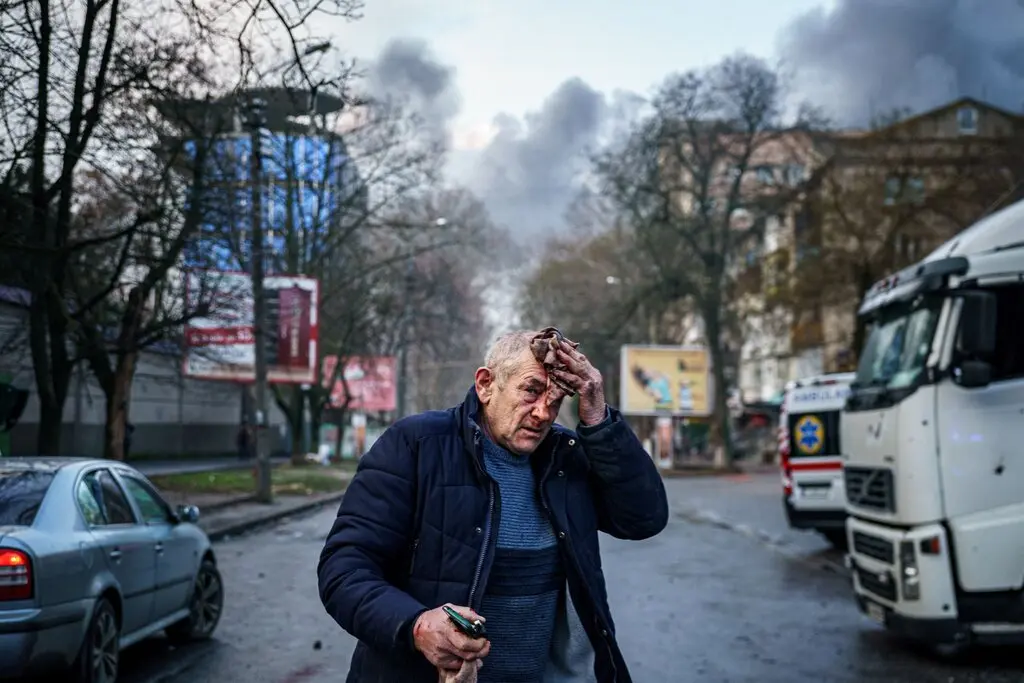Published
2 years agoon
By
Joe Pee
President Volodymyr Zelensky of Ukraine had urged vigilance after the military noted the presence of Russian ships carrying cruise missiles in the Black Sea.
Shelling in the recently recaptured Ukrainian city of Kherson killed at least 10 people on Saturday morning, hours after President Volodymyr Zelensky of Ukraine warned that another wave of Russian strikes could mar the Christmas holidays.
“With the approaching holiday season, Russian terrorists may become active again,” Mr. Zelensky said in his overnight address. “Therefore, please heed the air raid signals, help each other and always take care of each other.”
His comments came after the Ukrainian military warned on Friday that Russian ships carrying cruise missiles had entered the Black Sea for the first time since Dec. 16, when Moscow fired a barrage of missiles across Ukraine.
The streets of Kherson were busy on Saturday morning when Russian forces shelled the city center, according to Kyrylo Tymoshenko, deputy head of the president’s office.
A shopping area and residential buildings — “places where the most people are” — were hit, Yaroslav Yanushevych, the head of Kherson’s military administration, said in a statement. In addition to the 10 people killed, 55 people were wounded in the attack — of whom 18 were in serious condition, he later told Ukrainian television, according to the Ukrainska Pravda news outlet. Two of the wounded were volunteers who had been distributing food aid when the shells hit, according to Matthew Hollingworth, the U.N. humanitarian coordinator for Ukraine.
Images posted by Mr. Zelensky on his Telegram account of the attack’s aftermath showed several people and blood in the street, as well as burning cars. He said that they showed “the real life of Ukraine and Ukrainians.”
“In the morning, on Saturday, on the eve of Christmas, in the central part of the city,” Mr. Zelensky wrote. “These are not military facilities. This is not a war according to the rules defined. It is terror, it is killing for the sake of intimidation and pleasure.”
Ukraine celebrates Christmas as a national holiday on Dec. 25 — in line with the Western calendar — as well as on Jan. 7, for churches observing the Eastern Orthodox religious holiday.
The attack on Saturday was only the latest in Kherson, which has been battered by Russian shelling since Ukrainian forces retook the city last month. On Friday, five people in the region were killed and 17 others were wounded, Mr. Tymoshenkso said in an update before the most recent shelling.
The Christmas Eve bombardment, though — exactly 10 months after Russia invaded Ukraine, on Feb. 24 — prompted a rush of anger.
“While families in Europe, North America, and beyond prepare festive dinners, spare a thought for Ukraine,” the Ukrainian foreign minister, Dmytro Kuleba, wrote on Twitter alongside images of the aftermath.
The Ukrainian defense minister, Oleksii Reznikov, said that the “barbaric” shelling was Russia’s “revenge” on Kherson residents who had resisted the occupation, while Bridget Brink, the U.S. ambassador to Ukraine, condemned the “brutal” strike on a city whose citizens had “already suffered so much” when retreating Russian forces cut off power and water to Kherson on their way out.
“Truly horrific, especially on Christmas Eve,” she tweeted.
Russia’s war in Ukraine is now fought in two largely separate arenas: ground battles in the south and east, and air contests between Ukraine’s defense systems and Russia’s cruise missiles and drones aimed at electrical infrastructure. Military analysts say the infrastructure-targeting campaign is intended to demoralize Ukrainians and push their government into a cease-fire that might allow Russia time to regroup and rearm for future offensives.
Since October, Russia has fired volleys of missiles and drones at Ukraine’s energy infrastructure in intervals of roughly a week to 10 days, according to Ukraine’s military intelligence chief. Most barrages have included around 75 missiles.
That tempo is likely set based on Russia’s weapons supply, Britain’s defense intelligence agency said on Saturday.
“Russia has likely limited its long-range missile strikes against Ukrainian infrastructure to around once a week due to the limited availability of cruise missiles,” the agency said in its daily update. “Similarly, Russia is unlikely to have increased its stockpile of artillery munitions enough to enable large-scale offensive operations.”

























